CLICK BELOW TO WATCH FIRST!
DR. RON CLARK, CEO OF THE MAASAI TRUST
NEWS AND EVENTS
Our projects can become your projects.
See what we can do together!
The Maasai Relief and Recovery Initiative (MRRI): A Beacon of Hope
Transforming Maasai Health: The Community Health Improvement Program (CHIPS)
The Maasai Literacy and Education for Everyone Program (MLEEP)
The Maasai Water Project: Bringing Hope and Water to the Maasai Lands
Empowerment Through Agriculture and Livestock: Join Our Mission
Large Call to Action Headline
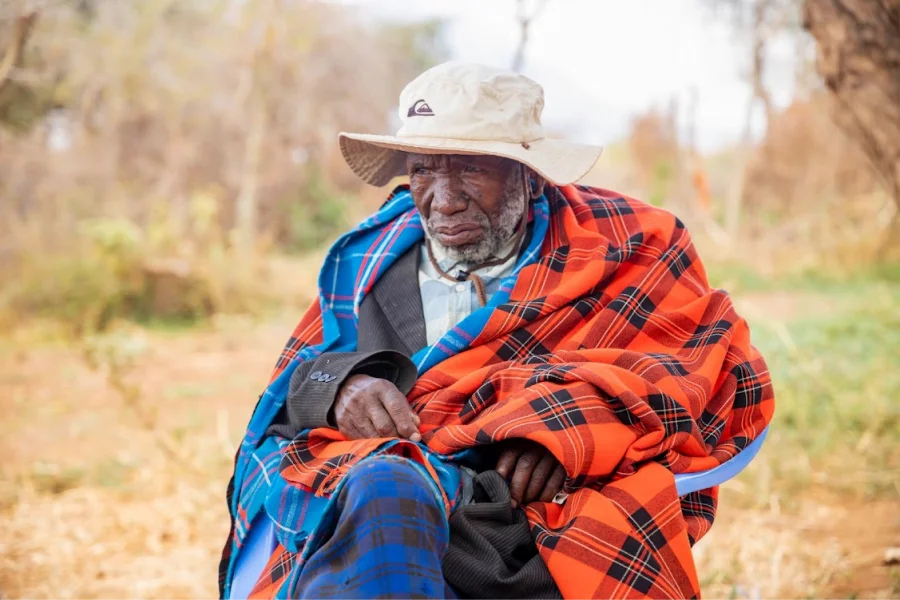
A Cry for Help: The Maasai and Samburu’s Battle for Survival
The Maasai Relief and Recovery Initiative (MRRI) is a visionary effort by The Maasai Trust to bring critical relief and sustainable recovery to the Maasai and Samburu people in Southern Kajiado, Narok, and Samburu Counties as well as North Tanzania.
Faced with unprecedented challenges due to severe droughts and resource scarcity, MRRI aims to address vital needs through community assessment, development of water infrastructure, emergency relief provision, education and and the empowerment of local communities. With a focus on immediate and long-term solutions, MRRI is a testament to our commitment to the Maasai’s well-being and resilience.
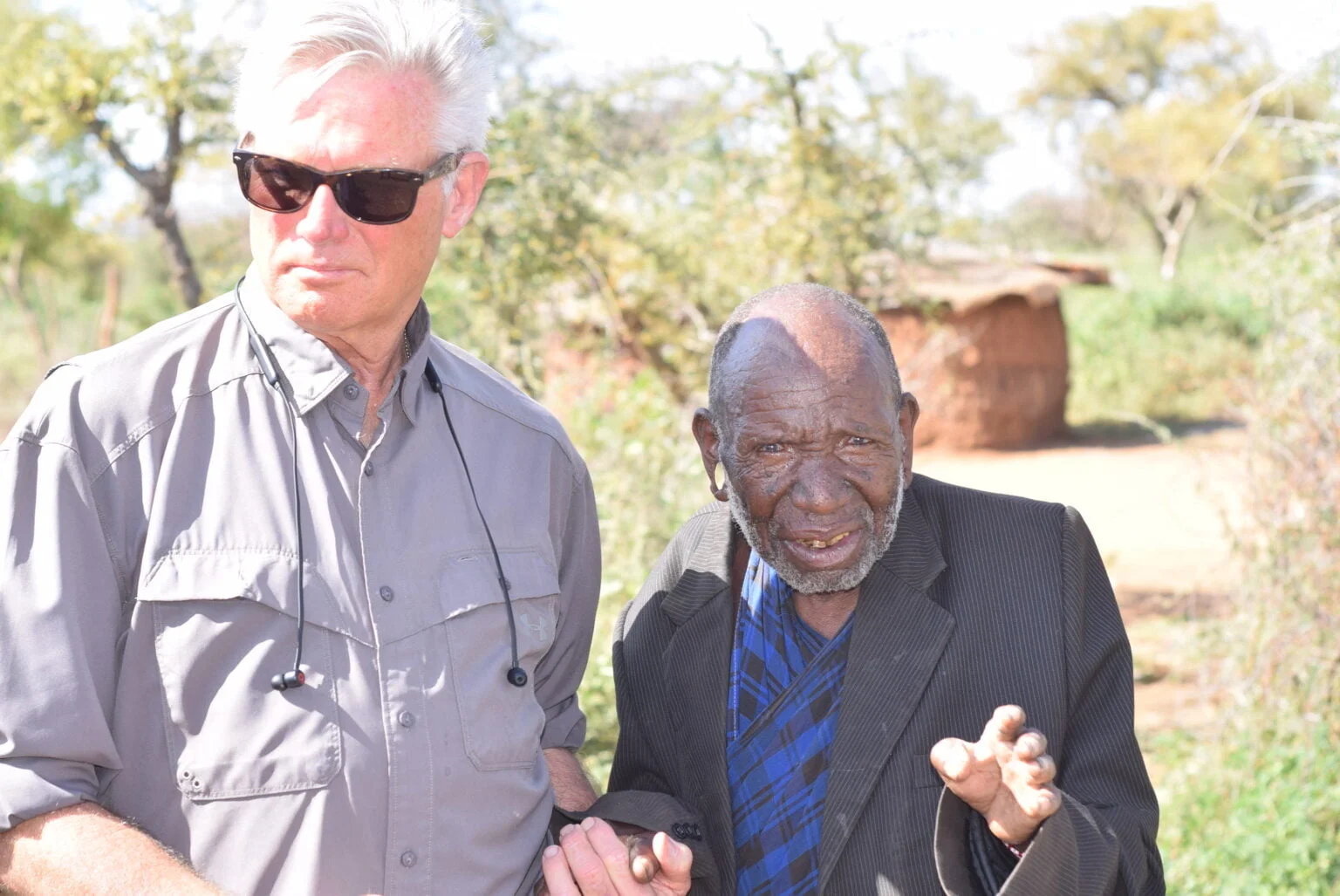
Will the Maasai Receive Their Help in Time?
In the heart of Maasai lands, the Community Health Improvement Program (CHIPS) is launched as part of the Maasai Rapid Recovery Initiative (MRRI) to address critical health challenges facing infants, children, and pregnant mothers. By focusing on Nutrition, Immunization, Hygiene Education, and Primary Health Care, CHIPS aims to build a foundation for a healthier Maasai future. With phased implementation ensuring focused attention to each essential need, we’re set to make a lasting impact on the well-being of the Maasai communities.
Dr. Ron and Ronda Clark: A Portrait of Service, Leadership, and Cross-Cultural Harmony
Dr. Ron Clark's narrative is not just one of spiritual leadership and academic contributions but also of dedicated service in the field of law enforcement and the military. Serving as a Military Policeman in the U.S. Army from 1974 to 1978, Dr. Clark exemplified discipline, integrity, and commitment to his country...
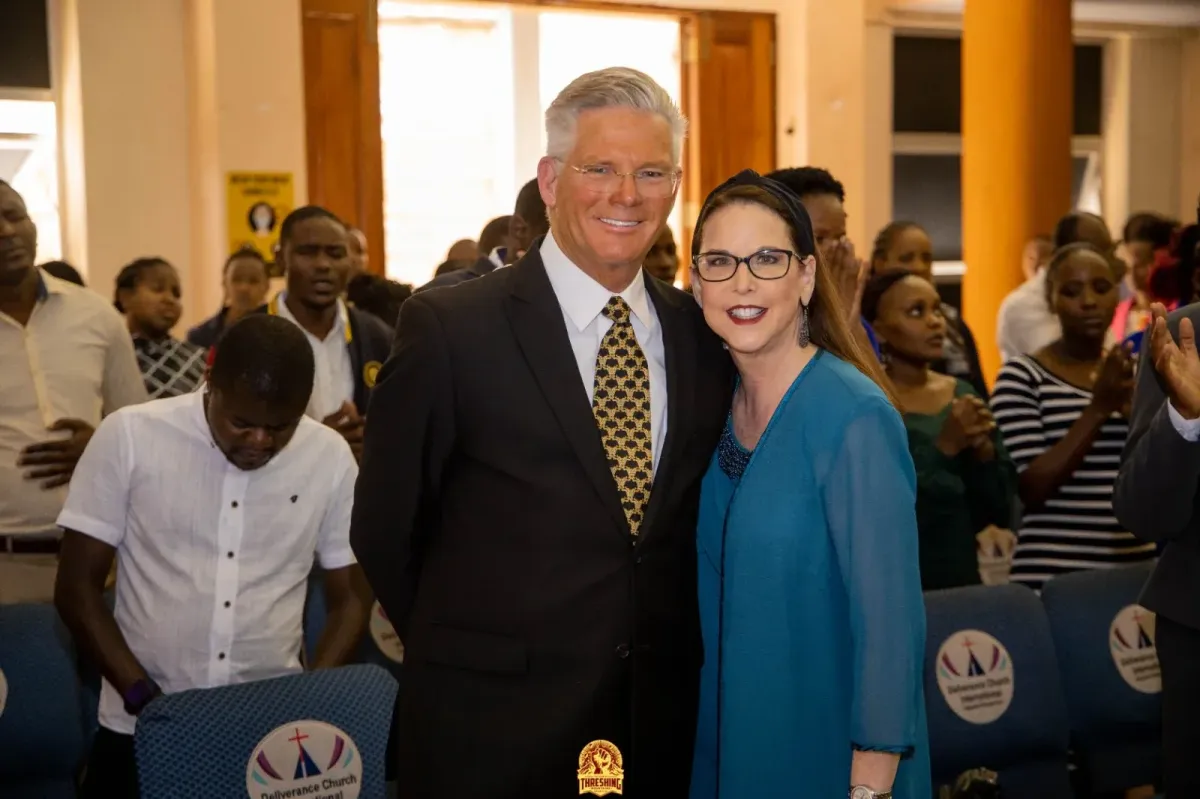
Dr. Biden Urges Starving Maasai to Explore New Career Paths
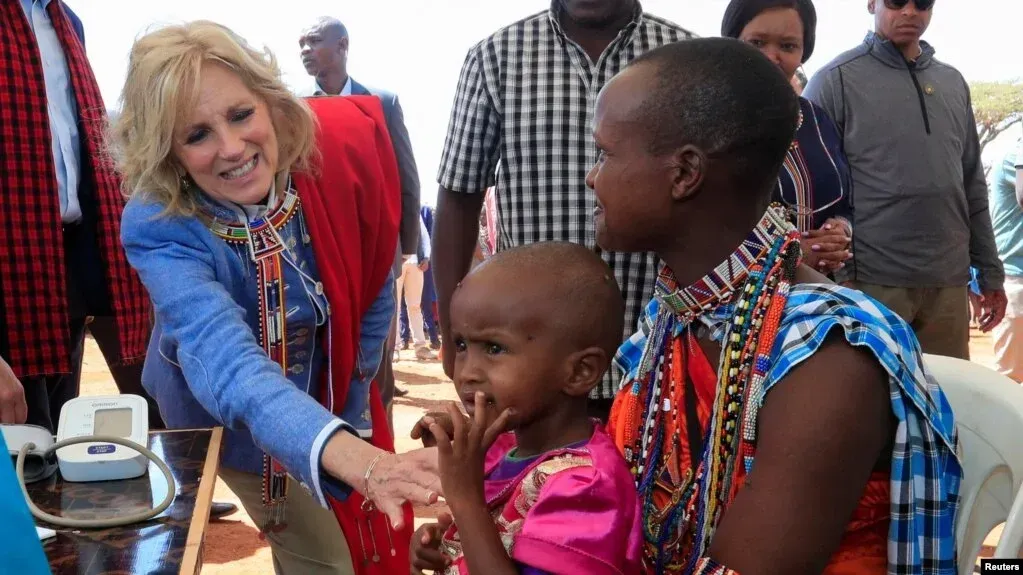
As dawn breaks over the sweeping savannah of Kenya's Kajiado County, the first rays of sunlight paint an ethereal portrait of Oldonyo Orok which means “Black Mountain” and rises on the border of Kenya with Tanzania. The Maasai compare it with Mount Kilimanjaro about 100 kilometres west which always has a s”now cap” on it, the mighty hill towering over the horizon like a silent sentinel. For those who have never ventured to this corner of the world, the landscape is a symphony of earth tones - shades of ochre, sienna, and sepia merging seamlessly beneath an endless expanse of azure sky...
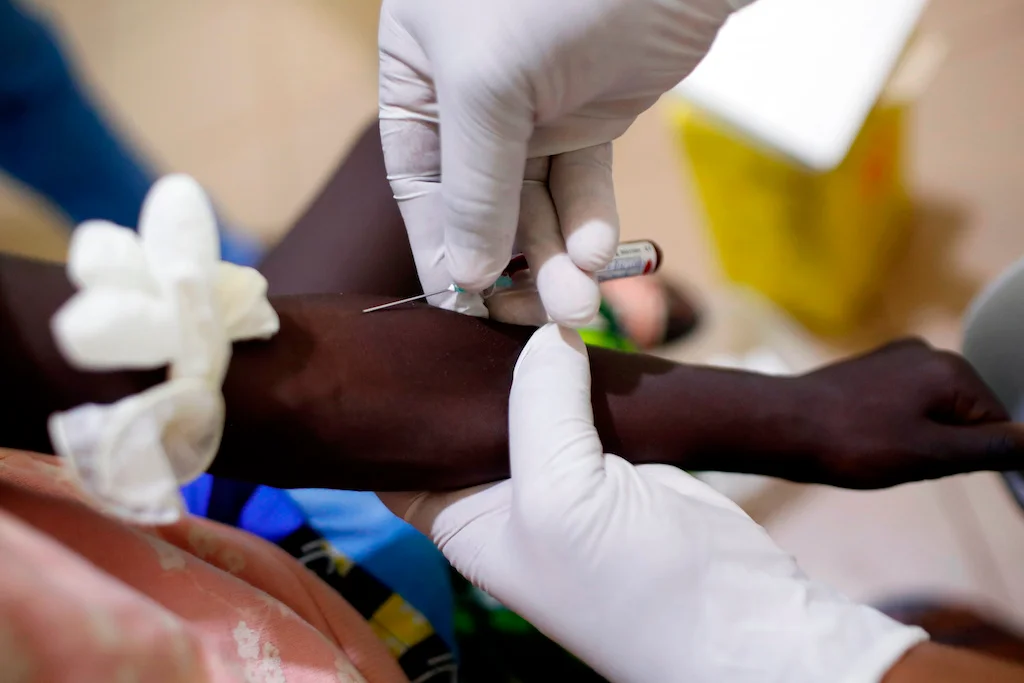
Transforming Maasai Health: The Community Health Improvement Program (CHIPS)
In the heart of Maasai lands, the Community Health Improvement Program (CHIPS) is launched as part of the Maasai Rapid Recovery Initiative (MRRI) to address critical health challenges facing infants, children, and pregnant mothers...
Emergency Food Distrubution Program
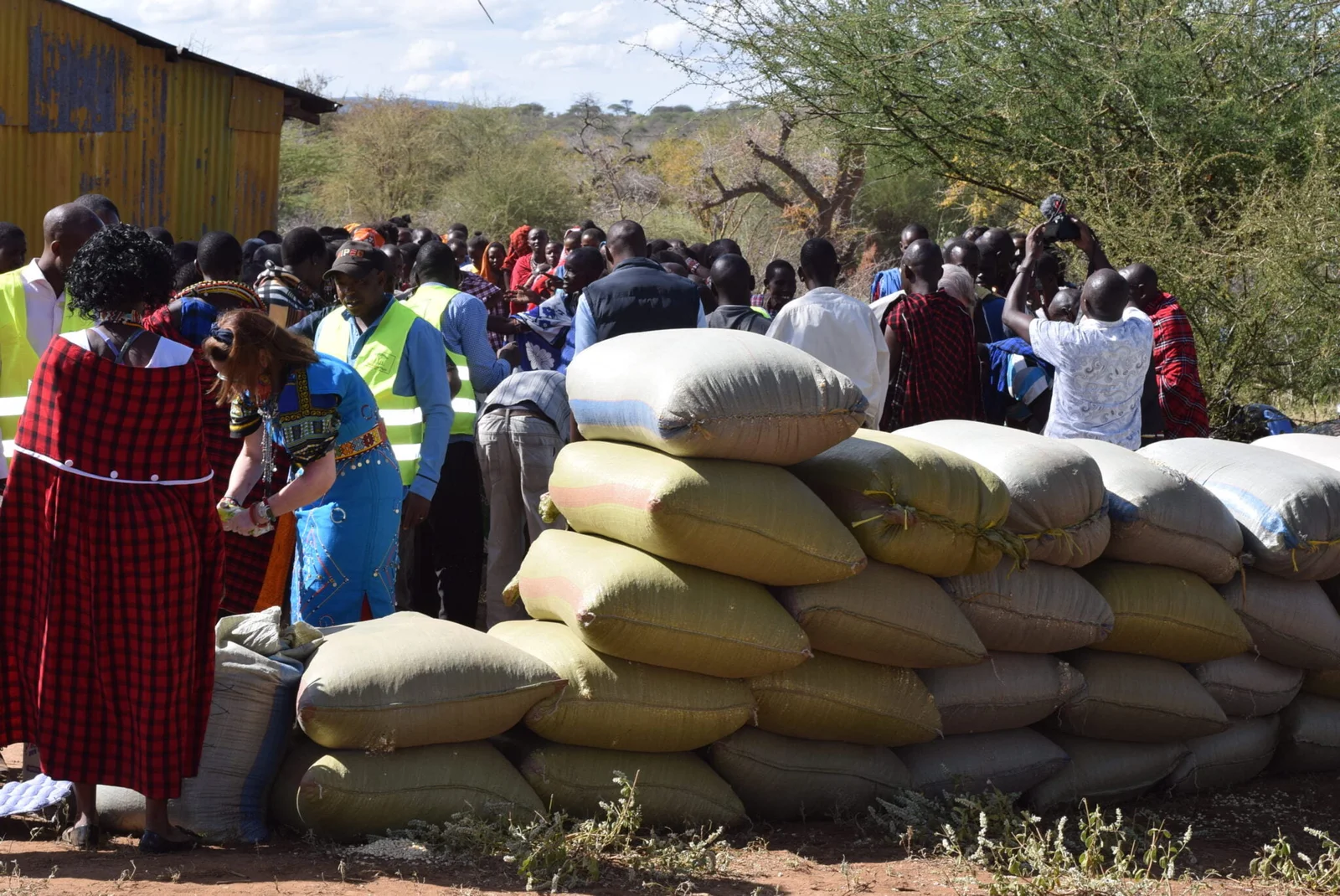
The Maasai Relief and Recovery Initiative (MRRI) is a visionary effort by The Maasai Trust to bring critical relief and sustainable recovery to the Maasai and Samburu people in Southern Kajiado, Narok, and Samburu Counties as well as North Tanzania.
Faced with unprecedented challenges due to severe droughts and resource scarcity, MRRI aims to address vital needs through community assessment, development of water infrastructure, emergency relief provision, education and and the empowerment of local communities. With a focus on immediate and long-term solutions, MRRI is a testament to our commitment to the Maasai’s well-being and resilience.

Will the Maasai Receive Their Help in Time?
Will the Maasai Receive Their Help in Time?
Introduction
In Kajiado County, Kenya, a humanitarian crisis is unfolding as 70 Maasai people die from starvation every day. This devastating reality has gripped the indigenous community, threatening their survival and centuries-old way of life.
At the center of this crisis stands Elder Nakau, a 98-year-old respected figure whose name means "Giant Anthill" in Maa. His story embodies the resilience and struggles of the Maasai people. Living 25 miles from the nearest town of Bisil, Elder Nakau has witnessed his community's transformation from prosperity to desperation as prolonged drought decimates their livestock and traditional way of life.
The Maasai Trust has emerged as a critical lifeline for these communities. Their immediate response to the crisis provides essential food aid and resources to families facing acute hunger. Through their efforts, 800 families recently received life-saving supplies - a testament to the power of timely intervention in the face of unprecedented hardship.
"Each passing day without aid claims more lives in our community. We need help now." - Elder Nakau
The Starvation Crisis Among the Maasai
The Maasai community is facing an unprecedented humanitarian crisis, with 70 lives lost every day due to starvation. Thousands are suffering from severe malnutrition, especially children and elderly members who are finding it difficult to get food in the dry landscape.
The Impact of Climate Change on the Maasai
Climate change has had a devastating impact on traditional Maasai pastoralism:
Drought periods lasting more than 24 months
Important water sources have completely dried up
Grazing lands have turned into lifeless wastelands
Traditional migration routes are no longer usable
The effect on livestock - which is essential for the survival of the Maasai - has been disastrous. Herds that used to number in hundreds have shrunk to just a few or vanished completely. A recent survey shows:
80% reduction in cattle populations
65% loss of goat herds
90% decrease in milk production
Critical shortage of animal-based protein sources
Ineffectiveness of Traditional Farming Practices
Traditional farming methods, passed down through generations, are not working against these extreme weather conditions. The Maasai's nomadic way of life, which used to perfectly adapt to East Africa's seasonal changes, is now unable to support their communities. Their ancestral knowledge of weather patterns, which is vital for managing livestock and growing crops, has become unreliable due to unpredictable climate shifts. This situation highlights the need for adaptive strategies in traditional farming practices that can withstand such climatic adversities.
The Broader Implications of the Crisis
The crisis goes beyond immediate food shortages. Without livestock to trade or sell, families do not have resources to buy additional food, creating a destructive cycle of poverty and hunger. Local markets are experiencing sharp price increases in basic goods, making it even harder for struggling families to afford essential nutrients. This economic strain further exacerbates the already dire situation faced by the Maasai community.
Cultural Significance of Livestock in Maasai Society
For the Maasai people, livestock represents far more than mere economic assets - these animals embody their cultural identity, spiritual beliefs, and social standing within the community. A Maasai's herd size directly correlates to their influence and respect among their peers, with cattle particularly holding a sacred position in their society.
The traditional Maasai belief system views cattle as a divine gift, entrusted to them by Enkai (their God). This deep-rooted connection manifests in various cultural practices:
Marriage ceremonies require livestock exchange as dowry
Coming-of-age rituals involve gifting animals to young warriors
Conflict resolution often uses cattle as compensation
Social bonds are strengthened through livestock lending and sharing
The current drought crisis has inflicted severe psychological trauma on Maasai pastoralists who've lost their herds. Elder Nakau's experience reflects a common narrative - watching helplessly as generations of carefully tended livestock succumb to harsh conditions. This loss strikes at the heart of Maasai identity, creating a profound sense of powerlessness and cultural displacement.
Many Maasai elders report feelings of deep shame and depression after losing their herds. Without livestock, they struggle to maintain their traditional roles as community leaders and providers. Young Maasai men face particular challenges, as herd ownership traditionally marks their transition into respected adults within the society.
Geographical Challenges and Historical Context of Drought in Kajiado County
Kajiado County's harsh terrain presents unique challenges for its inhabitants. Located in Kenya's Rift Valley region, the area experiences semi-arid to arid conditions with annual rainfall averaging below 500mm. The landscape features vast savannas interrupted by scattered acacia trees, creating an environment where water retention becomes particularly challenging.
The region's geological composition compounds these difficulties. Predominantly composed of volcanic soils, the ground struggles to retain moisture, leading to rapid water runoff during the rare instances of rainfall. This characteristic has historically limited agricultural possibilities, pushing the Maasai to rely heavily on pastoral activities.
Recent Trends in Drought Patterns
Recent years have witnessed an intensification of drought patterns in Kajiado County. The drought cycles, once occurring every decade, now manifest with alarming frequency:
2009: First major drought of the century affecting 70% of livestock
2015-2016: Extended dry period leading to 40% cattle loss
2021-2023: Current crisis claiming 70 lives daily in Maasai communities
Local Indicators of Change
The town of Bisil, situated 25-30 miles from Elder Nakau's community, serves as a stark indicator of these changes. Historical records show the area once supported thriving herds of wildlife and livestock. Today, the parched earth tells a different story - one of increasing desertification and diminishing resources.
Broader Impacts on the Environment and Communities
The drought's impact extends beyond immediate water scarcity. Soil degradation has accelerated, creating a cycle of environmental deterioration that threatens traditional Maasai grazing patterns. These changes force communities to adapt their centuries-old practices or face dire consequences.
Elder Nakau's Daily Struggles: Water Scarcity and Healthcare Access Issues in Bisil
At 98 years old, Elder Nakau's daily life revolves around a grueling 25-mile journey to access basic necessities. His weathered face tells the story of countless pre-dawn walks to fetch water, carrying heavy containers across the parched landscape of Bisil.
The nearest medical facility - a single clinic serving 2,500 residents - stands as a stark reminder of the healthcare challenges. When Elder Nakau's youngest grandchild fell ill with malaria, the family spent three days traveling to reach medical attention.
"Water is life, but for us, water means suffering," Elder Nakau shares, describing how his community members take turns making the arduous trek to distant water sources. Women and children bear the heaviest burden, spending up to six hours daily collecting water that's often contaminated.
The lack of proper sanitation facilities compounds these health risks. Many community members, including Elder Nakau's family, face waterborne diseases due to limited access to clean water sources. The nearest borehole, installed by a previous NGO project, ran dry two years ago.
NGO Response: A Mixed Bag of Hope and Disappointment for the Maasai People
The presence of NGOs in Kajiado County has created a complex landscape of aid and development initiatives. Several organizations have launched projects targeting critical needs:
Water Infrastructure Projects: NGOs like Water.org and Kenya Water for Health Organization have attempted to drill boreholes and establish water collection points
Food Distribution Programs: World Food Programme and local NGOs coordinate relief efforts during severe drought periods
Healthcare Initiatives: Organizations such as Doctors Without Borders provide mobile clinics and medical supplies
Despite these efforts, significant challenges have hampered the effectiveness of NGO interventions:
Limited Resource Distribution: Aid often fails to reach the most remote communities, leaving vulnerable populations like Elder Nakau's village without support
Project Sustainability Issues: Many water infrastructure projects have fallen into disrepair due to lack of maintenance funding and technical expertise
Cultural Misalignment: Some NGO approaches conflict with traditional Maasai practices, leading to resistance and reduced program effectiveness
The experience of the Maasai community with NGOs reflects a pattern of initial promise followed by incomplete implementation. A local community leader shares:
"They come with big promises and take many photos. They build something, then disappear. We need partners who stay, who understand our ways."
This disconnect between NGO intentions and on-ground realities has created skepticism among community members, highlighting the need for more sustainable and culturally sensitive approaches to aid delivery.
Dr. Jill Biden's Visit: Symbolism vs. Substance for Bisil Community Members
Dr. Jill Biden's visit to Bisil sparked initial excitement among the Maasai people. Her presence drew international attention to their plight, creating a brief moment of hope for substantial aid and support. The First Lady's team made promises of assistance and development projects that would address the community's critical needs.
The reality that followed painted a different picture. Weeks turned into months without tangible action or follow-through on the commitments made during her visit. The community watched as 70 people continued to die daily from starvation, their situation unchanged by the high-profile diplomatic event.
Local leaders express mixed feelings about the visit:
The media coverage raised awareness about their struggles
No concrete aid materialized from the international exposure
Resources spent on hosting the delegation could have fed hundreds of families
Security measures disrupted daily activities in Bisil
The visit stands as a stark reminder of the gap between diplomatic gestures and meaningful action. The Maasai people's immediate needs for food, water, and medical care remain unaddressed, highlighting the limitations of symbolic political visits in creating real change.
In particular, the lack of access to clean water is a pressing issue that requires urgent attention. As highlighted in a World Bank report, there is an untapped potential in Tanzania's water supply, sanitation, and hygiene sector that could significantly improve the living conditions of communities like Bisil.
The Birth of The Maasai Trust: A New Hope for Cultural Preservation and Development Initiatives
The Maasai Trust emerged as a beacon of hope under Dr. Ron's leadership, bringing a fresh approach to community support. This organization stands apart through its dual commitment to immediate crisis response and sustainable development that respects Maasai traditions.
The Trust's initiatives reflect a deep understanding of Maasai needs:
Educational Development: Construction of new schools equipped with modern facilities while incorporating Maasai cultural education into the curriculum
Land Rights Advocacy: Active protection of ancestral territories through legal support and community empowerment programs
Sustainable Agriculture: Introduction of drought-resistant farming techniques that complement traditional pastoral practices
Healthcare Access: Mobile medical clinics reaching remote communities like Elder Nakau's village
Water Infrastructure: Development of sustainable water sources through borehole drilling and rainwater harvesting systems
The organization's success stems from its grassroots approach, working directly with community elders to shape development priorities. Local Maasai leaders participate in decision-making processes, ensuring projects align with cultural values while addressing pressing needs.
Dr. Ron's vision for The Maasai Trust extends beyond crisis management. The organization creates partnerships with local businesses, educational institutions, and healthcare providers to build a sustainable support network. These collaborations strengthen the community's resilience against future challenges while preserving their unique cultural heritage.
Angel Investor Intervention: A Lifeline for 800 Families in Need
A game-changing moment came for the Maasai community when an anonymous donor stepped in with a generous gift of one million shillings (around $9,500 USD). This timely support set off a wave of relief efforts that reached deep into the struggling villages.
The Impact of the Donation
Thanks to this angel investment, the following resources were quickly deployed:
6,000 metric tonnes of essential food supplies
10,000 liters of clean water
A truckload of additional vital resources
The swift distribution of these resources brought immediate relief to 800 families - approximately 4,000 individuals who had been facing severe food insecurity. In remote areas where hope had begun to fade, the sight of delivery trucks arriving with life-sustaining supplies created a ripple of joy through the communities.
The Significance of Anonymous Giving
The anonymous nature of this benefactor's gift embodied the true spirit of humanitarian aid, demonstrating how a single act of generosity can create profound change in a community gripped by crisis. This intervention proved particularly crucial for families like Elder Nakau's, who had lost their traditional means of sustenance through the devastating drought.
However, such instances of angel investment are rare and often insufficient to address the broader systemic issues contributing to poverty and food insecurity. For instance, in regions like Afghanistan which is currently grappling with a severe healthcare crisis, such interventions alone cannot suffice.
Moreover, these situations are not just limited to Africa or Afghanistan. Similar human rights issues and food insecurity challenges can be observed in various parts of the world including Guatemala where food supply chain disruptions have exacerbated the situation.
How You Can Make a Difference: Supporting Ongoing Relief Efforts for the Maasai People Beyond Immediate Needs
The Maasai people face a devastating reality - 70 individuals die each day from starvation. Your support can change these statistics and save lives. Here's how you can make an impact:
1. Direct Financial Support
Make a one-time or recurring donation to The Maasai Trust
Sponsor a family's food and water supplies
Fund livestock replacement programs
Support water infrastructure projects
2. Raise Awareness
Share verified information about the Maasai crisis on social media
Host community fundraising events
Connect with local organizations supporting Maasai relief efforts
Engage your workplace in corporate social responsibility initiatives
3. Long-Term Solutions
Invest in water conservation projects
Back initiatives for alternative income sources
Fund healthcare access improvements
The Maasai Trust ensures your contributions reach those most in need. Each dollar provides essential resources like:
Food supplies for families
Clean water access
Medical care
Livestock support
Educational resources
Your action today creates ripples of change for generations. The Maasai people's rich cultural heritage and resilient spirit deserve preservation through these challenging times. By joining hands with established organizations, you become part of a vital support network that brings hope to communities facing unprecedented hardship.
Conclusion: The Urgency Of Action To Save Lives And Preserve Culture
The stark reality remains: 70 Maasai people die each day from starvation. These aren't just statistics - they represent families torn apart, communities disrupted, and an ancient culture fighting for survival.
The Maasai people face a dual crisis:
Immediate survival - The need for food, water, and basic necessities
Cultural preservation - The risk of losing centuries-old traditions and practices
The time to act is now. Each day of inaction costs precious lives and pushes this remarkable culture closer to extinction. Your support through The Maasai Trust can:
Provide emergency food relief to starving families
Help establish sustainable water sources
Support traditional farming practices
Preserve cultural knowledge for future generations
The Maasai's story isn't just about survival - it's about protecting humanity's diverse cultural heritage. By taking action today, you become part of their story of resilience and renewal. Visit The Maasai Trust's website now to join this critical mission of saving lives and preserving an irreplaceable culture.
FAQs (Frequently Asked Questions)
What is the current starvation crisis faced by the Maasai community?
The Maasai community is currently experiencing a dire starvation crisis, with approximately 70 individuals dying each day due to malnutrition. This situation has been exacerbated by prolonged drought conditions and the impact of climate change on traditional farming practices.
Why is livestock important to the Maasai culture?
Livestock plays an integral role in Maasai society as a primary source of sustenance and a symbol of wealth and status. The loss of livestock due to drought or disease has profound psychological effects on pastoralists, deeply affecting their cultural identity.
What challenges does Elder Nakau face in his daily life?
Elder Nakau faces significant challenges such as water scarcity, requiring long treks to fetch water from distant sources. Additionally, limited access to healthcare facilities poses further difficulties for him and his community.
How have NGOs responded to the needs of the Maasai people?
Various NGOs are working in Kajiado County to alleviate suffering among the Maasai population through initiatives like food relief distribution and water infrastructure development. However, challenges during implementation phases have sometimes hindered their overall effectiveness.
What was the impact of Dr. Jill Biden's visit to Bisil?
Dr. Jill Biden's visit to Bisil served as a momentary boost for morale among the community members but ultimately fell short in delivering concrete benefits or commitments from international stakeholders regarding their ongoing struggles.
How can individuals help support the Maasai people?
Individuals can contribute towards restoring dignity and hope among the Maasai community by financially supporting reputable charities, raising awareness about their plight, or engaging with ongoing relief efforts spearheaded by organizations like The Maasai Trust.
To discover more and how you can make a difference
Send us a message!
Our projects can become your projects. See what we can do together!
Confirmation Email: Check your inbox for a confirmation email with all the details of your consultation, including the date, time, and any additional information you may need.
Preparation: Feel free to gather any materials, ideas, or questions you’d like to discuss during our meeting.
Meeting: We’ll connect at the scheduled time to explore your vision and start planning your project.
If you have any immediate questions or need to make changes to your booking, please don't hesitate to contact us at (904) 999-8311.
Thank you for choosing The Maasai Trust. We’re excited to help bring your vision to life!
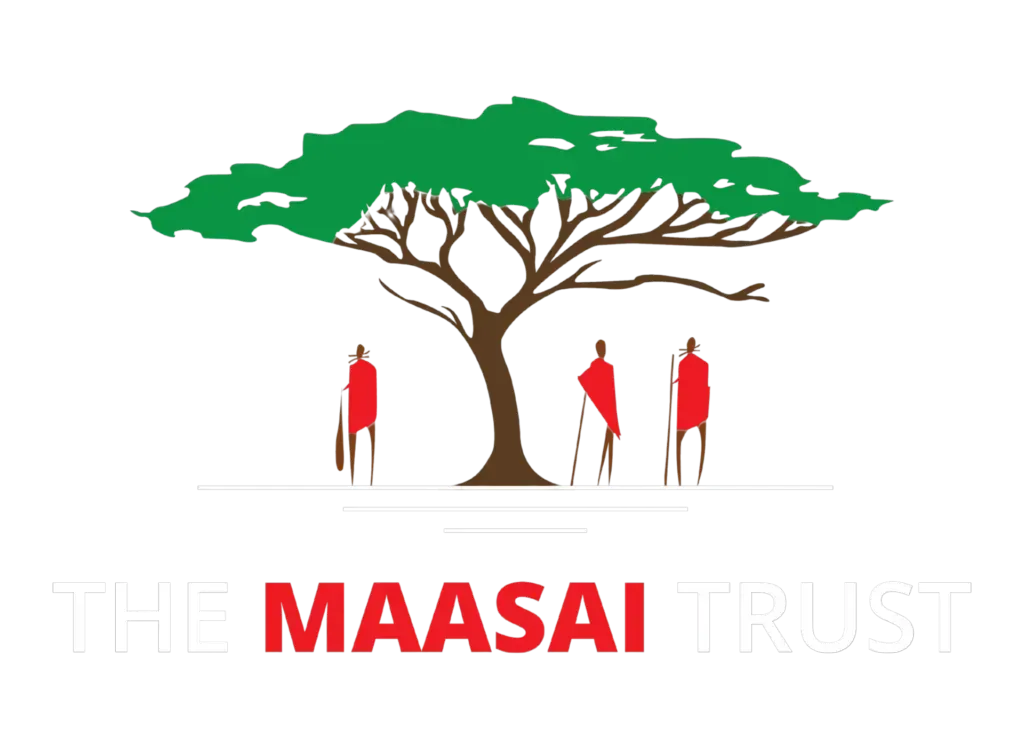
Join Us
© 2025. The Maasai Trust. All rights reserved.


